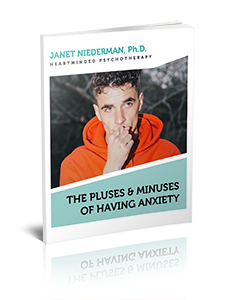As an Anxiety Therapist I know… you want real options for getting rid of your anxiety, while depending as little as possible on meds.
Has anxiety become your constant companion? If so, which form does it take for you?
- Do you spend a lot of time and energy figuring out how to avoid situations or people that make you nervous?
- Do you procrastinate because the idea of looking at the items on your to-do list overwhelms you?
- Maybe your first response is to worry, when other people seem to take the situation in stride.
- Or you tremble and your voice shakes when you need to give a speech.
- Your thoughts may not turn off at night because you’re ruminating about problems with the kids, work, school, or the future.
- You might get frequent headaches or stomach problems.
- Your panic attacks may have brought you to the ER—or almost to the ER—many times.
- Perhaps your anxiety is at the core of your PTSD (Post Traumatic Stress Disorder), which is trauma you experienced in the recent or distant past.
 Clearly, there is a wide range of anxiety symptoms that can easily begin to monopolize your time. They are each the result of your fight/flight system getting turned on in order to protect you from danger, but then not turning off when the emergency has passed.
Clearly, there is a wide range of anxiety symptoms that can easily begin to monopolize your time. They are each the result of your fight/flight system getting turned on in order to protect you from danger, but then not turning off when the emergency has passed.
I can imagine what you probably want – a sense of calm you carry with you, whether you’re at work or school, spending time with friends, or just sitting by yourself. You want a genuine solution to turn off that emergency mode and feel okay. You’re waiting for the day when you can turn it off easily—or not get it triggered in the first place—so that you won’t get stressed by every situation that comes your way.
Anxiety Is the Most Common Mental Health Issue
If you’re struggling with anxiety, you’re not alone. At least 40 million other adults in the U.S. have anxiety intense enough to negatively affect their sense of wellbeing. Today’s quick pace and disconnectedness have only made matters worse.
Everyone is born with an emergency survival response hard-wired into their nervous system. From an evolutionary perspective, it helped us survive in the dangerous world of lions, tigers, and wolves. When we sensed danger it turned on so we could either fight to defend ourselves or run away—whichever would most increase our chances of survival. Our heart rate quickened, our breathing changed, and our vision sharpened. If fighting was our best chance, blood raced to our arms; if fleeing was our best chance, blood raced to our legs. Once we were safe, fight/flight turned off and we entered a state of “rest and repair,” where we could again digest our food, relax and think clearly.
 But the world has changed, and lions, tigers and wolves no longer endanger us. Our biggest “threats” are other people, such as parents, teachers, bosses, neighbors, friends, and strangers. In most of these interactions, the survival impulse gets us into trouble if we don’t quickly block it. We’re social beings and we live with laws; we can’t beat up our neighbors or run away from our employers when we feel threatened. Instead, we must rely on thinking and communicating in order to solve our problems.
But the world has changed, and lions, tigers and wolves no longer endanger us. Our biggest “threats” are other people, such as parents, teachers, bosses, neighbors, friends, and strangers. In most of these interactions, the survival impulse gets us into trouble if we don’t quickly block it. We’re social beings and we live with laws; we can’t beat up our neighbors or run away from our employers when we feel threatened. Instead, we must rely on thinking and communicating in order to solve our problems.
Nevertheless, fight/flight responses can be triggered many times during a day or during a week, needing us to block or inhibit it frequently. Then the energy it generates has nowhere to go. Its residue stays locked in the body as muscle tension, heightened stress hormone levels, and even constricted breathing.
Everyone is challenged by anxiety from time to time. For individuals whose anxiety symptoms dominate their life, their fight/flight response turns on too frequently, or doesn’t turn off easily once on. Fortunately, anxiety is treatable regardless of where or how it affects you. The quality of your life depends on taking the right steps. With help, you can significantly reduce these symptoms and experience peace once again.
What To Expect In Anxiety Therapy
In therapy for anxiety, you and I will explore how you experience your anxiety so that I can begin to provide the symptom relief you need. Then we’ll go deeper so that I can learn about the main ingredients fueling your nervousness and tension. These ingredients might include specific events in your life that frightened you, core beliefs you developed which convinced you that you’re not adequate, or nervous system over-reactivity brought on by years spent in chaotic environments. I’ll help you work through the difficult events that have caused your anxiety to spiral out of control.
Releasing fearful emotions stuck in the mind and body is the genuine antidote for a chronically turned-on fight/flight system. You won’t need to depend on artificially changing negative thoughts into positive ones. Depending on the situation I may help you increase your attunement to your over-aroused state to help you to shift away from it, or use an emotional energy approach to help you release over-arousal from your system. You’ll likely feel the results in your body and greater clarity in your thinking. Previous clients have told me that, as a result of the work we’ve done, their blood pressure has returned to normal or that they’re now able to communicate with parents or partners in ways they never thought possible.
Clients’ goals are reached when there is once again a healthy balance between living in “rest and repair” and entering into emergency mode only when needed by the current situation. Will you never be anxious again? No. That would be unrealistic. We simply want to return anxiety to its original purpose: alerting us to a problem that needs our attention, which we then reasonably think through to figure out what we want to do about it.
During the past 30 years, I have guided many, many people through this process of anxiety reduction to arrive at a new quality of life; it’s wonderful to witness clients’ return to feeling in charge of their lives. That’s why I’m confident you can get better, too.
You may still have reservations about anxiety therapy…
Everyone gets nervous. Why should I go to therapy to fix this?
 You’re right. Everyone does get nervous from time to time. It’s a matter of degree: what’s the intensity, what’s the frequency, and what’s the extent to which it interferes with your life? If your anxiety is giving you headaches, making you worry endlessly, upsetting your digestion, keeping you awake at night, raising your blood pressure or stopping you from speaking up for yourself, then therapy may be the right solution for you.
You’re right. Everyone does get nervous from time to time. It’s a matter of degree: what’s the intensity, what’s the frequency, and what’s the extent to which it interferes with your life? If your anxiety is giving you headaches, making you worry endlessly, upsetting your digestion, keeping you awake at night, raising your blood pressure or stopping you from speaking up for yourself, then therapy may be the right solution for you.
Why can’t I just use medicine for anxiety?
Medication from a physician can certainly be helpful to reduce anxiety temporarily, particular when the level of anxiety is so high that it is disrupting your ability to function in daily life. However, no medicine can identify or heal the sources of your anxiety. Psychotherapy offers the best hope of discovering the root causes of your anxiety and responding to these causes genuinely. And in serious conditions where medicine is needed, research has shown that therapy and medicine combined is better than medication or therapy by itself.
I don’t want to relive the scary or painful events in my life in order to get better.
While we may choose to work with the events or memories that initiated the anxiety or fear in order to achieve genuine and lasting relief, we don’t want to re-immerse ourselves in these painful events and feel terrible all over again. Fortunately, that’s no longer necessary. Today, there are many options for working with traumatic memories to release their pain and calm our nervous systems without entering into the details of the events themselves should they feel too difficult or overwhelming. In fact, when you search for an anxiety therapist, one of your priorities should be finding someone who can work effectively without re-traumatizing you. This is one of my priorities — working gently with you to provide relief while minimizing the chance of re-traumatization.
As an experienced anxiety therapist, I can help you realize your dream of a less stress-filled life.
I truly hope you give yourself permission to start letting go of the tension you’ve been living with and permission to take the next step in helping yourself.
If you would like to learn more, download my free report. When you’re ready, you can schedule a free phone consultation so that I can address any questions you might have. Please take your anxiety-related problems seriously enough to decide to work towards the wellness you deserve.
If you prefer to email me a brief message, click here.

